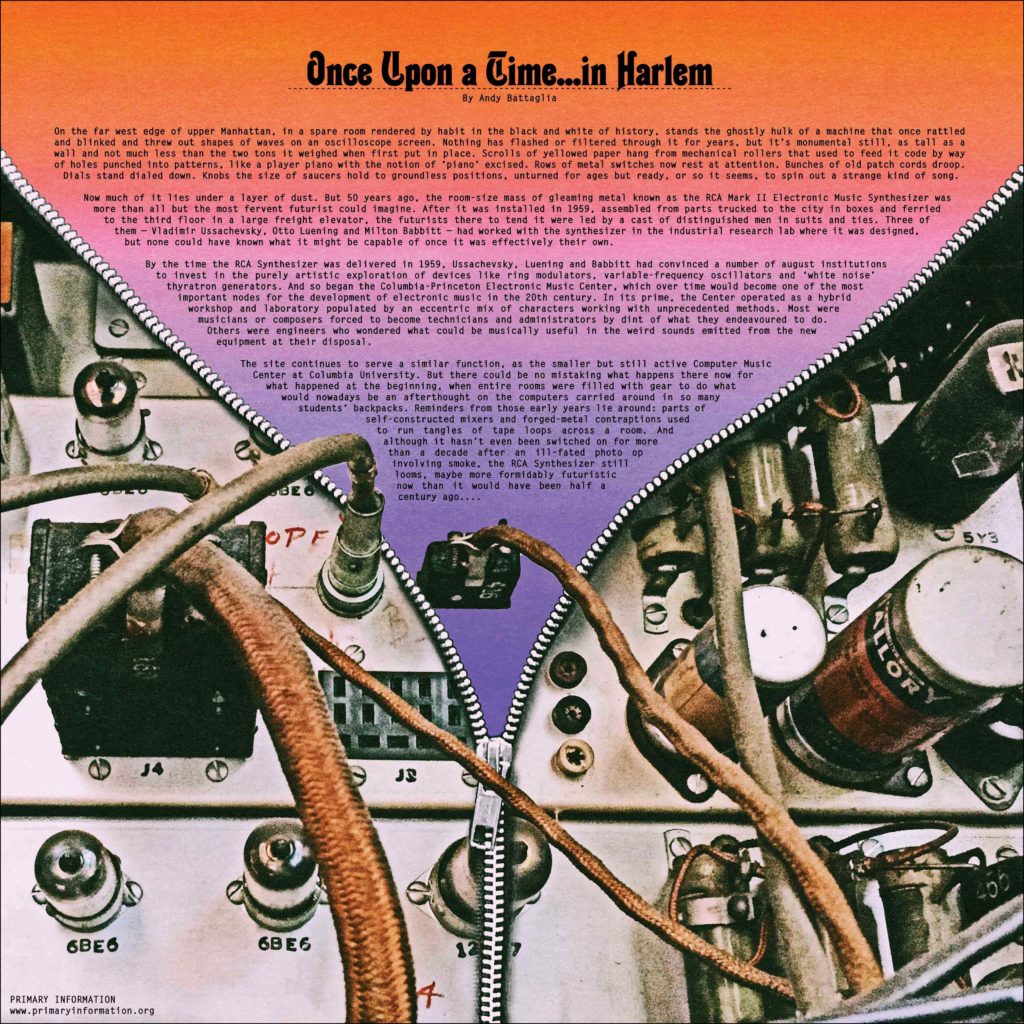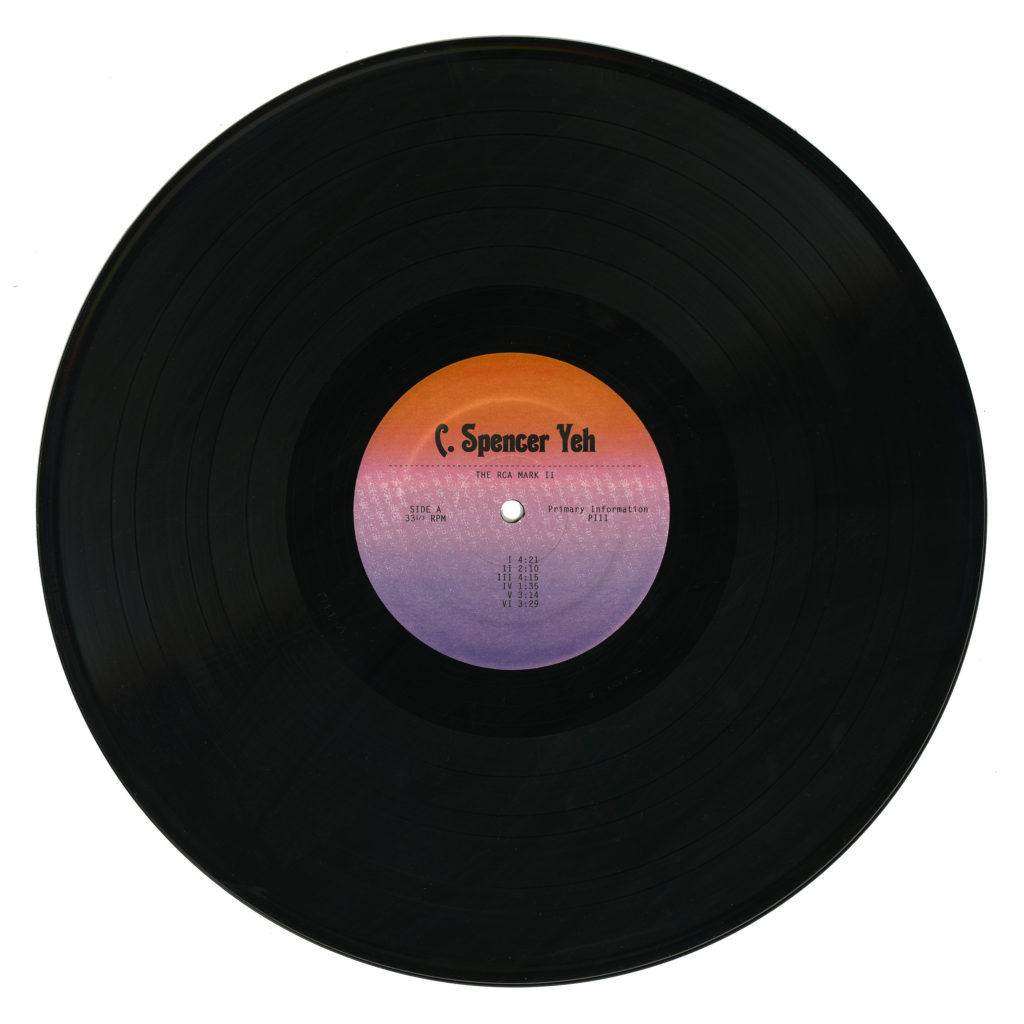There aren’t many things in experimental music more iconographically reified than the vintage synthesizer. For ‘noise music’ as a meme, it is crucial: an incel nerd taps the trust fund, ignoring real life obligations in order to spend thousands of dollars on mythological hardware instruments, for what? Miles away from the retrospectively quarantined transgression of artists like Throbbing Gristle, or whoever, they attempt to carry on the edgelord lineage by noodling in basements, drinking tall boys, and selling ‘cassettes,’ or so we are told.

The title of NYC-based musician C. Spencer Yeh’s recent album for Primary Information—The RCA Mark II, released on November 15 — is a little provocative at first glance, then. Confirming initial suspicions, it was recorded entirely with a historically significant synthesizer: the RCA Mark II was the first programmable synth, built and installed at the Columbia-Princeton Electronic Music Center in 1959. What makes this record interesting is the fact that the room-size instrument simply stopped working in 1997. Yeh acoustically performed with the lifeless synth using flicking, twisting, and molding gestures, recording the results with contact and room microphones before editing them together into stark, sensitively composed mini-epics.
Spectrality rears its head in this staged encounter with historical legacy as a figuration of the (absent) presence of the past. As such, it is worth situating its specific character here in relation to the discourse surrounding hauntology popularized in the first decade of the millennium. According to Mark Fisher, hauntological music mourned the disappearance of the future’s ‘effective virtuality’ — its ability to condition expectations and motivate cultural production — reflecting the inability of the social imagination to “conceive of a world radically different from the one in which we currently live.” This ethos is straightforwardly echoed in the title of the Caretaker’s 2009 album Sadly, The Future Is No Longer What It Was.
The RCA Mark II gives the listener nary an idea what C. Spencer Yeh thinks about the future, though, and refrains from ‘investigating’ the past in any sweeping sense. Rather, the record is immersively unsentimental and non-nostalgic, delicately yet persuasively bringing the listener into a grounded sense of the present. Yeh’s compositions are deeply rooted in the quotidian — a person stands in a room with a broken machine — and remarkable for the degree to which they generate liveness and intrigue in a deeply unspectacular context. “One of my favorites was bending and loosening the really old, stiff cables in the back of the machine, creating a particular crackling sound that takes years and years of gathering dust and neglect to achieve,” he said in a press release.
On a musical level, Yeh primarily modulates the acoustic recordings of the Mark II using a technique that combines rhythmic looping with scrubbing. On the first of twelve untitled tracks, atomized tones most striking for their discrete minutia snowball into jagged clusters skirting along a vector. A few songs later, fidgety percussive bricolage takes on the soaring character of ecstatic free jazz improvisation. Often, these pieces give the listener an intimate sense of Yeh pushing a cursor through sound laid out in flexible horizontality, navigating an arboreal Mark II file directory on the fly, looking for earworming sections that send sparks across the nervous system. Scrubbing as a compositional strategy is interesting in part for the odd sense of temporality normally associated with the action: urgent, compulsive, and slightly awkward, even annoying. Its character in most user interfaces is defined negatively, being primarily used to skip unwanted information, but here it takes on positive content with a sense of voracious inventiveness.

It is tempting to call Yeh’s approach a kind of ascetic Prometheanism running on a local network, hyperlocal and figuratively ‘off the grid.’ The sonic material is rendered expansive strictly on the basis of cognitive-manual reengineering. And yet, the artist in fact does relatively little in his hands-on encounter with the Mark II; what may have initially seemed like libidinally-charged détournement begins to look a little more like detumescence. That the main process of technical intervention takes place in post-production is notable. For the most part, Yeh lets the synthesizer as a so-called ‘black box’ be, choosing detached neutrality over the socially-conditioned will to mastery that would motivate someone to decode its inner workings.
Deleuze writes that the passive danger of computers in the control society is jamming, while the active one is piracy or the introduction of viruses. The total absence of either of these conditions — aside from Yeh’s basically neutral repurposing of scrubbing as a performance technique — is another specter that animates the album, not without a grain of absurdist humor. The RCA Mark II is a cunning exercise in pointlessness, on a certain level. It is compelling less for some kind of programmatic “relationship to the archive” with predetermined market value than for the sense that, unlike a certain hauntological disposition driven by nostalgia, Yeh might have an ambivalent relationship with ghost stories.**
C. Spencer Yeh’s The RCA Mark II album was released via New York’s Primary Information on November 15, 2017.













